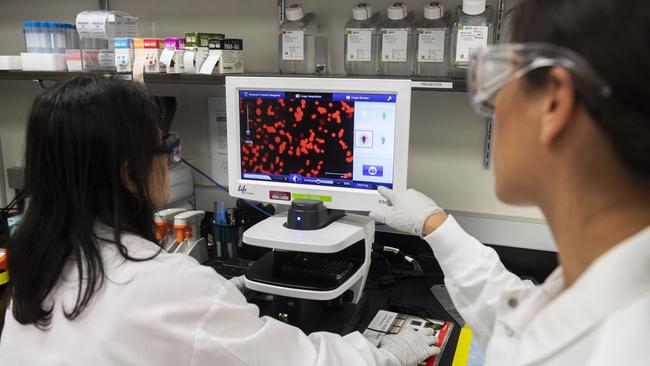First coronavirus vaccine trials to begin in UK this week
Two vaccine developers, one of whom will begin human trials on Thursday, are awarded £42.5m grants by the UK government.

The British government has awarded grants of £42.5m to two vaccine developers in an attempt to fast-track a coronavirus cure.
As global cases soared past 2.5 million, Health Secretary Matt Hancock confirmed one of the grant recipients — the Oxford University vaccine trial at the Jenner Institute — would begin human trials this Thursday. The other, the Imperial College London, was on Tuesday advertising for prospective healthy volunteers to be part of its upcoming trial in the coming months.
Health Secretary @MattHancock has revealed a vaccine currently being worked on by @UniofOxford will begun human trials on Thursday.
— BBC Breakfast (@BBCBreakfast) April 21, 2020
On @BBCBreakfast on Monday Professor Sarah Gilbert from @NDMOxford @JennerInstitute spoke about the trials #covid19 pic.twitter.com/kF0srWDTNU
The news comes as the prime minister Boris Johnson recovered enough to have a phone conversation with the US president Donald Trump on Tuesday.
With the number of deaths in the UK rising by 823 to 17,337, the UK will also investigate what appears to be 8000 “excess deaths” in the week before Easter. The UK’s Office of National Statistics said it appeared 80 per cent of those deaths, which occurred outside of hospitals, may be coronavirus related, with the other 20 per cent likely to be from heart attacks and strokes as people delayed going to hospital because of the pandemic.
5/5 – global #coronavirus death comparison. pic.twitter.com/LgxSo0YSg8
— UK Prime Minister (@10DowningStreet) April 21, 2020
At the daily press conference, Mr Hancock said: “I can announce that the vaccine from the Oxford project will be trialled in people from this Thursday. In normal times, reaching this stage would take years and I’m very proud of the work taken so far.
“At the same time, we will invest in manufacturing capability so that if either of these vaccines safely work, we can make it available for the British people as soon as humanly possible.”
Mr Hancock said he wanted to back the scientists to the hilt, adding: “The upside of being the first country in the world to develop a successful vaccine is so huge that I am throwing everything at it.”

The Cabinet is split on whether to maintain social distancing measures, but insiders say Mr Johnson was so impacted by his own health battle he wants to keep the country locked down to avoid a second peak.
The Oxford study, led by Professor Sarah Gilbert, has made bold claims that the first batches of a vaccine it has called ChAdOx1 nCoV-19 could be made available in six months if the trial is successful.
But other scientists have cautioned that the biggest pitfall for any new vaccines is not that they don’t work, but that they aren’t effective in older people. This is a crucial point as the most vulnerable members of the public in the coronavirus pandemic are men aged over 70 with hypertension.
The prospects of producing a Covid-19 vaccine are very good says Professor Sarah Gilbert, Vaccinologist at Oxford University
— BBC Politics (@BBCPolitics) April 19, 2020
#Marr #coronavirus https://t.co/PUH4VzgnFN pic.twitter.com/OhyEiAQ6QK
The Oxford study will begin testing on 510 volunteers between 18 and 55 years of age. They will receive injections of a small part of the coronavirus code, packaged into a harmless virus. This is designed to spark a natural immune response and provide some immunity if the person is then exposed to the coronavirus. Volunteers will be monitored for six months, with some to be given a second vaccine shot in four weeks’ time.
The trial is to be expanded to volunteers aged between 55 to 70 years, and then later moving on to the over-70 age group. A randomly-selected control group will be vaccinated against meningococcal disease.
Phase 3 of the trial will involve as many as 5000 people.
“The best-case scenario is that by the (northern hemisphere) autumn of 2020, we have an efficacy result from phase 3 and the ability to manufacture large amounts of the vaccine, but these best-case time frames are highly ambitious and subject to change,” Professor Gilbert said.
This Oxford trial has been able to start human trials quickly because the team had earlier been working on a vaccine for the related MERS coronavirus, which had been tested safely in animal and early stage human testing.
Excited that UKRI have made an infogram explaining our work https://t.co/5Ab41xZtyH
— Robin Shattock (@roboskis) April 17, 2020
Meanwhile at Imperial College, Professor Robin Shattock and his team is developing a “self-amplifying RNA vaccine”. The idea behind this vaccine is that when stabilised spike protein is injected it will deliver the genetic instructions to muscle cells to provoke an immune response and create immunity to the virus. This vaccine is currently being tested on animals but is soon moving to human trials.
Other vaccines in human trials around the world are being developed by CanSino Biological and the Beijing Institute of Biotechnology, Inovo Pharmaceuticals, and Moderna.








To join the conversation, please log in. Don't have an account? Register
Join the conversation, you are commenting as Logout